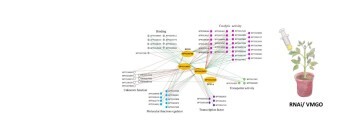Plant galactolipid dLGG suppresses lung metastasis of melanoma through deregulating TNF-α-mediated pulmonary vascular permeability and circulating oxylipin dynamics in mice
This study demonstrates the pharmacological activity and the underlying molecular mechanisms of phytoagent dLGG isolated from medicinal plant Crassocephalum rabens (Asteraceae) on inhibition of melanoma cell EMT, tight junction permeability, and extravasation of melanoma cells in vivo that support the novel therapeutic effect of dLGG against melanoma lung metastasis. These study results are the important evidence to support the anti-cancer “Zhaohe Cao Botanical Drug” IND approval by US FDA. We investigated the in vivo dLGG effect against melanoma (B16 COX-2/Luc) lung metastasis and cisplatin was used as the control drug. dLGG and cisplatin significantly inhibited melanoma lung metastasis and prolonged mean survival time of mice compared to the tumor control group. dLGG treatment inhibited proliferative and invasive activities of metastasized melanoma cells in mouse lung tissues, down-regulated the expression of proteins involved in epithelial-mesenchymal transition (vimentin, snail, TGF-, and -catenin), inhibited immune check point markers PD-1 and PD-L1, and macrophages and neutrophils infiltration, and promoted CD8+ Tc cells recruitment in mouse lung microenvironment. Oxylipins play a crucial role in mediating inflammation and carcinogenesis. Our LC/MS-based metabolomics study demonstrated that a 12-fold increase of circulating oxylipin 17-HDHA in mouse serum by dLGG treatment. We observed for the first time that 17-HDHA and dLGG inhibited B16 melanoma cells to secret TNF-, subsequently inhibited the TNF--induced disruption of tight junction proteins (claudin/ZO2) expression in human umbilical endothelial cell monolayer. 17-HDHA and dLGG can down-regulate Src/pyk2 signal transduction pathway which is associated with tight junction proteins functions to maintain pulmonary epithelial structure integrity.同研究人員:Chung-Chih Yang, Cheng-Kuei Chang, Meng-Ting Chang, and Lie-Fen Shyur*

Lie-Fen Shyur
Distinguished Research Fellow
(02) 2787-2102
jaclyn@gate.sinica.edu.tw
A731, Agricultural Technology Building
Lab.
A728, Agricultural Technology Building
Tel: (02) 2787-2100
- 07/2018- to date Distinguished Research Fellow, Agricultural Biotechnology Research Center, Academia Sinica
- 05/2019-08/2019 Visiting Scholar of UC Davis, USA
- 03/2008- 8/2016 Vice Director, Agricultural Biotechnology Research Center, Academia Sinica
- 2008-2018 Research Fellow, Agricultural Biotechnology Research Center, Academia Sinica
- 2008-2014 Coordinator of Molecular and Biological Agricultural Sciences program of Taiwan International Graduate Program (TIGP-MBAS), Academia Sinica
- 2003-2008 Associate Research Fellow, Agricultural Biotechnology Research Center, Academia Sinica
- 1998-2003 Assistant Research Fellow, Institute of BioAgricultural Sciences, Academia Sinica
- 1994-1997 Postdoctoral Research Fellow, Department of Biochemistry and Biophysics, Iowa State University, USA
- 1991-1992 Postdoctoral Research Fellow, Department of Agricultural Chemistry, National Taiwan University
- 1990-1991 Postdoctoral Research Fellow, Department of Biochemistry, Chang Gung University
SPECIAL ACHIEVEMENT
- Received US FDA approval for Zhaohe Cao (???)-based botanical drug for an Investigational New Drug (IND) for cancer therapy (2017).

